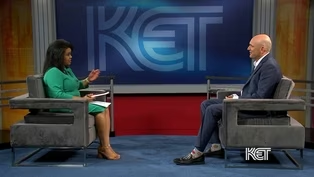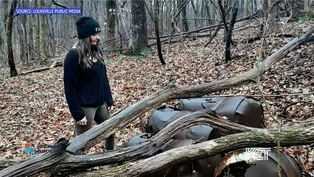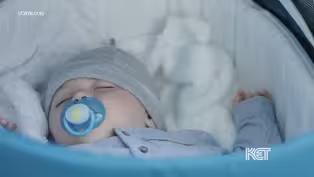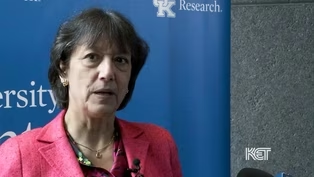
Tornado Chasing Par for the Course at WKU
Clip: Season 3 Episode 7 | 4m 8sVideo has Closed Captions
Going on a tornado chase can be a bucket-list adventure.
Meteorologist Christie Dutton talks with WKU professor and meteorologist Josh Durkee who recently returend from this year's storm chase.
Problems playing video? | Closed Captioning Feedback
Problems playing video? | Closed Captioning Feedback
Kentucky Edition is a local public television program presented by KET

Tornado Chasing Par for the Course at WKU
Clip: Season 3 Episode 7 | 4m 8sVideo has Closed Captions
Meteorologist Christie Dutton talks with WKU professor and meteorologist Josh Durkee who recently returend from this year's storm chase.
Problems playing video? | Closed Captioning Feedback
How to Watch Kentucky Edition
Kentucky Edition is available to stream on pbs.org and the free PBS App, available on iPhone, Apple TV, Android TV, Android smartphones, Amazon Fire TV, Amazon Fire Tablet, Roku, Samsung Smart TV, and Vizio.
Providing Support for PBS.org
Learn Moreabout PBS online sponsorshipGoing on.
A tornado chase can be a bucket list adventure for some, but it's part of the curriculum for some Western Kentucky universities students.
Our Kristie Dutton talks with WQ professor and university meteorologist Josh Durkee, who recently returned from this year's storm chase.
Dr. Josh Durkee, you created this program.
It's been going for 15 years.
And just this year alone, you all traveled over 7000 miles with eight students, nine different states for two weeks.
So this is a pretty cool storm chase program.
Tell us a little bit about the program and how it started.
I started in the meteorology program when the program began in 2008.
And one of the things I one of the ideas I had for helping to grow the program was to bring this philosophy of teaching students by giving them the opportunity to to learn by doing, if you will.
And a lot of our students want to be professional forecasters.
And it's easy to sit in a classroom and make forecasts and, you know, get away with a bad forecast here and there.
But the storm chase program forces students to put their money where their mouth is, if you will.
And we went to wake up and we think if storms are going to do a certain thing 500 miles away, we have to commit to traveling to that point to document that forecast outcome.
And there's no better way to learn than to do it that way.
So that was kind of the initial idea for the program.
Very well said.
Learn by doing.
And it's kind of a big payoff because you're kind of chasing those big severe storms and hopes that you might see a tornado.
And you all lucked out this year, right?
Tell us about what you saw.
Yeah, that when it's at the beginning of the trip, it's always a little more surprising or shocking, you know, because we're fresh on the scene.
And this was early in the trip and we're navigating through Oklahoma.
And so, again, for the students, this is the stuff that's straight out of movies and social media.
So they're living the dream in Oklahoma.
We're on these big storms and we got within a fairly good location to view this rotating thunderstorm and watch it go through that whole cycle of developing that rotation to producing a tornado in that moment.
And it was very exhilarating.
Now, what about the two tornadoes you saw in Texas?
What were those like?
So in Texas, that was a different day because a lot of driving on that day.
So the Oklahoma day was not as much driving to get there.
But for the Texas day, we woke up in southeast Colorado and drove 600 miles to catch up with this storm developing near Midland, Texas.
And that was a little more hectic because it was around a more urban area.
And we try to stay away from those types of environments.
So we went ahead and got south of the city and the storm was actually moving south.
So that positioned as well to to view this storm and it was moving very slow and produced a really large tornado, particularly large tornado for about 25 minutes and allowed us to to view that event through its whole lifecycle.
So that was also a really exciting time.
Yeah, and I bet it's got to be a bonding moment for those students, too, right?
It is.
You know, for better or worse, we always learn a lot more about each other trapped in that van for two weeks together.
But we all come back, you know, different.
And the students really get close and be, you know, we develop lifelong friendships out of this this program.
So it's pretty neat to see that as well.
Yeah, absolutely.
Sounds awesome.
Well, thank you so much for your time.
Yes.
Thank you.
And thank you, Christi, for that.
Since the annual two week storm chase began in 2010, Dr. Josh Durkee says the student teams have collectively driven the distance around the equator more than four times impressive.
Discussing Election Integrity in Kentucky
Video has Closed Captions
Clip: S3 Ep7 | 4m 44s | Discussing Election Integrity in Kentucky. (4m 44s)
Headlines Around Kentucky (6/11/2024)
Video has Closed Captions
Clip: S3 Ep7 | 2m 36s | Headlines Around Kentucky (6/11/2024). (2m 36s)
More Help For Parents Looking For Child Care
Video has Closed Captions
Clip: S3 Ep7 | 3m 45s | Ryker's Requests is named in honor of a Franklin County infant who died at a daycare in 2022. (3m 45s)
Video has Closed Captions
Clip: S3 Ep7 | 3m 7s | NIH Director Visits UK. (3m 7s)
Providing Support for PBS.org
Learn Moreabout PBS online sponsorship
- News and Public Affairs

Top journalists deliver compelling original analysis of the hour's headlines.

- News and Public Affairs

FRONTLINE is investigative journalism that questions, explains and changes our world.












Support for PBS provided by:
Kentucky Edition is a local public television program presented by KET



